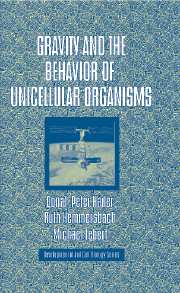Book contents
- Frontmatter
- Contents
- List of Abbreviations
- Preface
- 1 Introduction
- 2 Methods in Gravitational Biology
- 3 Image Analysis
- 4 Ciliates
- 5 Flagellates
- 6 Other Organisms
- 7 Responses to Other Stimuli
- 8 Energetics
- 9 Models for Graviperception
- 10 Evolutionary Aspects of Gravisensing: From Bacteria to Men
- 11 Perspectives
- References
- Index
4 - Ciliates
Published online by Cambridge University Press: 18 August 2009
- Frontmatter
- Contents
- List of Abbreviations
- Preface
- 1 Introduction
- 2 Methods in Gravitational Biology
- 3 Image Analysis
- 4 Ciliates
- 5 Flagellates
- 6 Other Organisms
- 7 Responses to Other Stimuli
- 8 Energetics
- 9 Models for Graviperception
- 10 Evolutionary Aspects of Gravisensing: From Bacteria to Men
- 11 Perspectives
- References
- Index
Summary
Ciliates can be regarded as swimming sensory cells. Their ion channels in the cell membrane have been extensively studied, and a direct correlation between particular ion currents, the membrane potential, the control of ciliary activity, and the swimming behavior of the cells was established. Conclusively, changes in ion fluxes can be identified by corresponding changes in swimming velocity and swimming direction. Thus, ciliates represent suitable model systems to study with noninvasive methods the effects of changes of environmental stimuli on the cellular level. By studying distinct graviresponses (gravitaxis and gravikinesis) under different gravitational stimulations, new results were found indicating that different mechanisms for graviperception have been developed. Uniquely, in the ciliate family Loxodidae, specialized gravireceptor organelles exist, whereas in other species, common cell structures seem to be responsible for gravisensing. Based on the fact that in many ciliates mechanosensitive ion channels are arranged in a bipolar manner and thus ideally suited for perception of the linear stimulus gravity, the old “statocyst hypothesis” was renewed. In the current hypothesis, gravity (e.g., in Paramecium) is perceived by sensing the mass of the cell body via distinct stimulation of mechanosensitive ion channels. Signal amplification by cytoskeletal elements, as well as involvement of the ubiquitous second messenger cAMP, seems likely.
- Type
- Chapter
- Information
- Gravity and the Behavior of Unicellular Organisms , pp. 51 - 74Publisher: Cambridge University PressPrint publication year: 2005

